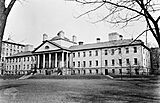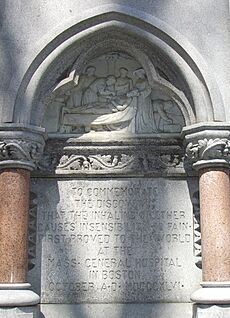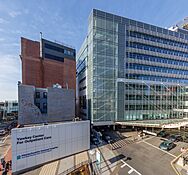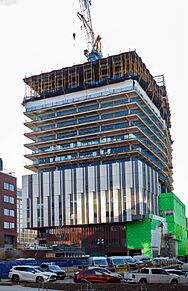Massachusetts General Hospital facts for kids
Quick facts for kids Massachusetts General Hospital |
|
|---|---|
| Mass General Brigham | |
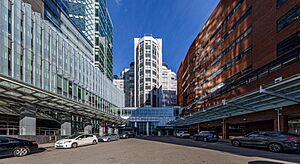
The Lunder Building (left), Main Entrance (center), and Wang Building (right) in 2024.
|
|
| Geography | |
| Location | 55 Fruit Street, Boston, Massachusetts, United States |
| Coordinates | 42°21′46″N 71°04′08″W / 42.36278°N 71.06889°W |
| Organization | |
| Funding | Non-profit hospital |
| Hospital type | Teaching and Research |
| Affiliated university | Harvard Medical School/Harvard University |
| Services | |
| Emergency department | Level I Adult Trauma Center / Level I Pediatric Trauma Center |
| Helipad | (FAA LID: 0MA1) |
| Beds | 999 |
| History | |
| Founded | 1811 |
Massachusetts General Hospital, often called Mass General or MGH, is a famous teaching hospital in Boston, Massachusetts. A teaching hospital is where new doctors learn from experienced ones while caring for patients. MGH is the main teaching hospital for Harvard Medical School.
It is also a major center for medical research. In 2021, it had a research budget of over $1.2 billion. MGH is the third-oldest general hospital in the United States and has 999 beds for patients. It is a founding member of Mass General Brigham, the largest healthcare group in Massachusetts.
Contents
History of the Hospital
MGH was founded in 1811. Its first building was designed by the well-known American architect Charles Bulfinch. Only two general hospitals in the United States are older: Pennsylvania Hospital (1751) and New York Hospital (1771).
The idea for the hospital came from doctors at Harvard Medical School who wanted a place to care for the poor. In the 1800s, wealthy people were usually treated at home. Hospitals like MGH were built to help those who couldn't afford home care. The first patient, a 30-year-old sailor, was admitted on September 3, 1821.
A Breakthrough in Surgery
One of the most important events in medical history happened at MGH. On October 16, 1846, a dentist named William Thomas Green Morton showed that a gas called ether could be used to prevent pain during surgery. This is called anesthesia.
In a room now known as the Ether Dome, Dr. Morton gave ether to a patient named Edward Gilbert Abbott. Then, the chief surgeon, John Collins Warren, removed a tumor from Mr. Abbott's neck. The patient felt no pain. Dr. Warren, who was at first doubtful, said, "Gentlemen, this is no humbug." This discovery changed surgery forever, making it painless for patients. The Ether Dome is still there today and is open to the public.
Pioneering Medical Advances
MGH has been a place of many "firsts."
- Radiology: Walter J. Dodd started the hospital's radiology department right after X-rays were discovered in 1895. He was a pioneer in using X-rays to see inside the body.
- Computer Programming: In the 1960s, the hospital helped create a computer programming language called MUMPS. It was designed to handle patient records and other medical information.
- First Replanted Limb: On May 23, 1962, surgeons led by Dr. Ronald A. Malt performed the first successful reattachment of a completely severed limb. A 12-year-old boy named Everett Knowles had his arm torn off in an accident. Doctors at MGH worked as a team to reattach the blood vessels, bone, and skin, saving his arm.
Facilities and Operations
The main MGH campus is on Fruit Street in Boston, near the Charles River. The hospital is huge, with over 25,000 employees, making it the largest non-government employer in Boston.
Each year, MGH handles about 1.5 million outpatient visits. This means people come to the hospital for check-ups or treatments but don't stay overnight. The hospital has 1,011 beds and admits about 50,000 patients each year. Surgeons perform over 34,000 operations annually, and over 3,800 babies are born there every year.
The hospital continues to grow. In 2011, the Lunder Building opened, adding 150 new beds. A major expansion project, including a new building with 482 beds, is expected to be finished by 2030.
The hospital is easy to get to using Boston's public transit system, the MBTA. The Charles/MGH stop on the Red Line is right next to the hospital.
Massachusetts General Hospital for Children
| Massachusetts General Hospital for Children | |
|---|---|
| Mass General Brigham | |
 |
|
| Organisation | |
| Funding | Non-profit hospital |
| Hospital type | Children's hospital |
| Affiliated university | Harvard Medical School |
| Services | |
| Emergency department | Level I Pediatric Trauma Center |
Massachusetts General Hospital for Children (MGHfC) is a special hospital for kids located right inside Mass General. It is a children's hospital that provides care for babies, children, and teenagers up to age 21.
MGHfC has about 100 pediatric beds and is also a teaching hospital affiliated with Harvard Medical School. It has a neonatal intensive care unit (NICU) for newborn babies who need special care and a pediatric intensive care unit (PICU) for critically ill children.
Awards
MGHfC is recognized as one of the best children's hospitals in the country. Here are some of its national rankings from U.S. News & World Report.
| Specialty | Rank (In the U.S.) | Score (Out of 100) |
|---|---|---|
| Neonatology | #42 | 79.1 |
| Pediatric Diabetes & Endocrinology | #28 | 70.7 |
| Pediatric Gastroenterology & GI Surgery | #25 | 79.6 |
| Pediatric Pulmonology & Lung Surgery | #23 | 77.6 |
| Pediatric Urology | #47 | 51.1 |
The Mass General Research Institute
The Mass General Research Institute (MGRI) is the part of the hospital focused on scientific research. It has the largest hospital-based research program in the U.S., with a budget of over $1 billion. Researchers at MGRI work in more than 30 departments and centers to understand diseases and find new ways to treat them.
Many important scientists work at MGH. Thirteen Nobel Prize winners have worked or trained at the hospital. In 2019, 55 MGH scientists were named among the most influential in the world.
Discoveries from MGH Research
Research at Mass General has led to many new medical treatments. Here are a few examples:
| Treatment | Description | Investigator |
|---|---|---|
| Enbrel | A treatment for autoimmune diseases | Brian Seed, PhD |
| Duralt Longevity E1, Vivacit-E | A special plastic that makes orthopedic implants last longer | William H. Harris, MD, DSc and Orhun Muratoglu, PhD |
| Coolsculpting | A method for removing fat by freezing it | Rox Anderson, MD |
| INOmax | A treatment for breathing problems in newborn babies | Warren Zapol, MD |
| Victoza | A treatment for type 2 diabetes | Joel Habner, MD |
| Visudyne | A therapy for an eye disease that can cause vision loss | Tayyaba Hasan, PhD |
Mass General Cancer Center
The Mass General Cancer Center is a world-class center for treating cancer. It is one of only 53 centers in the country to be named a Comprehensive Cancer Center by the National Cancer Institute. This is a special title given to centers that are leaders in cancer research and patient care.
The center has locations throughout New England, making it easier for patients to get treatment closer to home.
Awards and Recognition
MGH is consistently ranked as one of the top hospitals in the United States by U.S. News & World Report. In 2012 and 2015, it was named the #1 hospital in the nation.
Nobel Prize Winners
Thirteen scientists who worked or trained at MGH have won the Nobel Prize, one of the highest honors in science.
- 1934 George R. Minot, MD
- 1947 Carl F. Cori, PhD
- 1953 Fritz A. Lipmann, MD, PhD
- 1972 Gerald M. Edelman, MD, PhD
- 1985 Michael S. Brown, MD, and Joseph L. Goldstein, MD
- 1989 J. Michael Bishop, MD
- 1990 Joseph Edward Murray, MD and Donnall Thomas, MD
- 1998 Ferid Murad, MD, PhD
- 2009 Jack W. Szostak, PhD
- 2011 Ralph Steinman, MD
- 2012 Robert Lefkowitz, MD
- 2024 Gary Ruvkun, PhD
See also
 In Spanish: Hospital General de Massachusetts para niños
In Spanish: Hospital General de Massachusetts para niños
- Proto (magazine)
- Schwartz Center for Compassionate Healthcare
 | Audre Lorde |
 | John Berry Meachum |
 | Ferdinand Lee Barnett |


